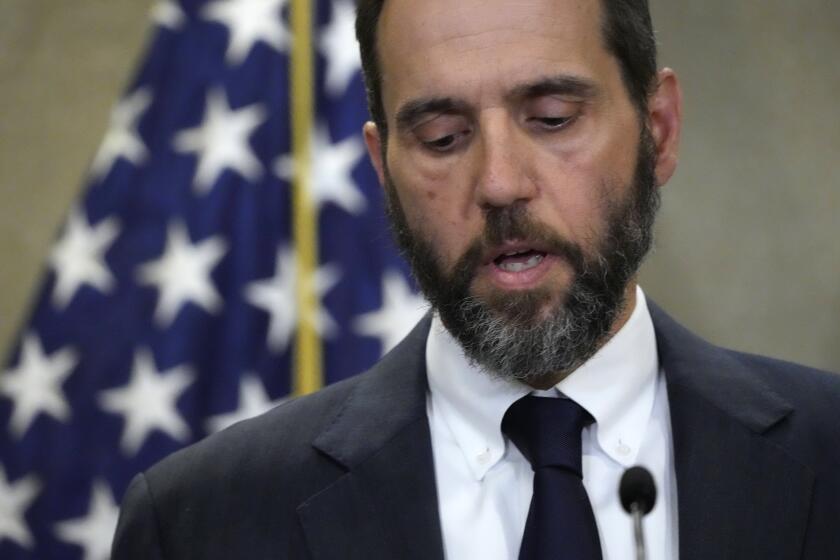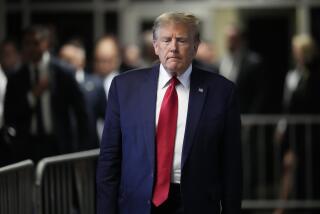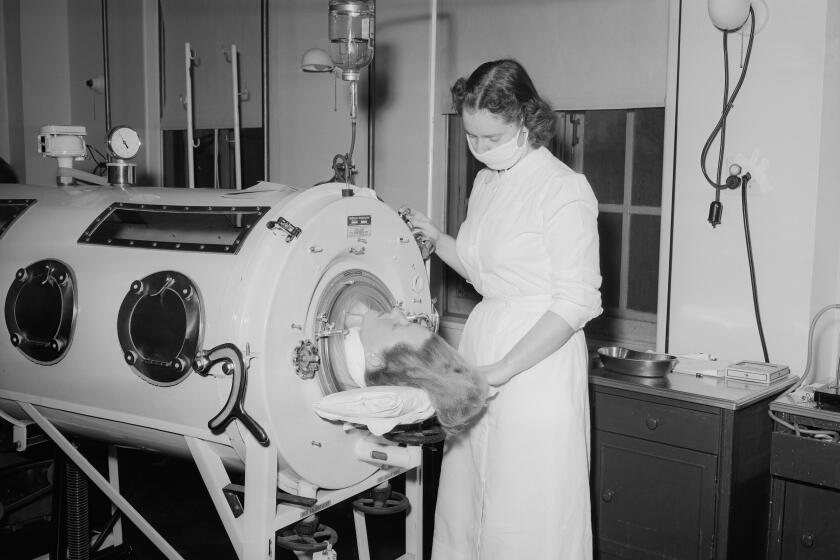Column: How Trump’s trial will go well beyond the charges to paint a damning portrait of him

- Share via
The scheme at the heart of the charges against Donald Trump in New York is well-known: To keep allegations of an affair with the adult-film actress Stormy Daniels from becoming public, Trump is accused of agreeing to pay her $130,000, camouflaged as payments to Michael Cohen for legal services. It’s in the camouflaging that Trump is charged with committing the 34 felonies at issue before a jury starting Monday.
But the jury, and the country, are going to hear a lot of evidence of Trump’s other allegedly wrongful acts — and a virtual avalanche of such evidence should the defendant decide to testify. That will paint a broader and more damning portrait of Trump, who is reportedly already on tenterhooks about Daniels’ expected testimony, giving him even more opportunities to complain that he is the victim of a no-holds-barred railroading at the hands of Manhattan Dist. Atty. Alvin Bragg.
Bragg’s team can introduce information about Trump’s other alleged misconduct under New York’s rules of evidence, which mirror the federal courts’. Known in New York as “Molineux evidence,” after the case that defined it, it’s generally considered a bonanza for prosecutors and a bane of defendants.
The former president can be expected to stick to his political strategy despite its legal risks and Judge Juan M. Merchan’s lack of patience for it.
It’s an axiom of criminal law that jurors should assess guilt or innocence based on the defendant’s conduct in the case before them. That means they shouldn’t make their decision based on judgments about the defendant’s character — for example, that the defendant is a “bad person” who, having done bad things in the past, probably did them again. So it would be improper to introduce the fact that an alleged bank robber previously robbed a bank to show that he is a “bank-robbing kind of person” and therefore likely committed the bank robbery he’s now charged with.
New York’s rule generally prohibits the prosecution from relying on “character” or “propensity” evidence to urge conviction. But it’s riddled with exceptions that permit prosecutors to offer evidence of prior bad acts for many purposes other than character, including to show “motive, opportunity, intent, preparation, plan, knowledge, identity, absence of mistake, or lack of accident” — more or less anything other than the forbidden character inference.
The special counsel urged the Supreme Court to let the case proceed as soon as possible rather than delaying it for theoretical questions about presidential immunity.
One example in Trump’s case, greenlighted by the court over his vigorous objections, concerns a “catch and kill” scheme in which the National Enquirer agreed to buy and then bury embarrassing stories about the then-candidate. That’s not what happened in Daniels’ case, but Judge Juan M. Merchan agreed to let the prosecution present it to the jury. His rationale was that it is part of the same “narrative of events that precipitated” the alleged falsification of records and could help prove Trump’s purported intent to conceal allegations of affairs from voters.
Merchan likewise ruled that the prosecution may introduce a transcript of the notorious “Access Hollywood” tape in which Trump boasted of sexually assaulting women. The judge found that the comments could help show Trump’s motive for concealing the alleged Daniels affair because the revelation of the tape was a crisis for his campaign.
For similar reasons, Merchan is permitting testimony from model Karen McDougal about the affair she says she had with Trump and the Enquirer’s suppression of her story. Likewise, the court approved a limited presentation of evidence about the alleged purchase of information from a Trump Tower doorman, Dino Sajudin, to the effect that Trump fathered a child with a housekeeper.
The court will instruct the jury to regard the evidence only for its permissible purposes — for example, to demonstrate intent — and not to infer that because Trump may have done something bad before, he probably did so again. But trial lawyers understand that inferring acts based on character is human nature; it’s very hard in practice to prevent jurors from indulging the impermissible inference.
Moreover, if Trump takes the stand — as he has flatly asserted he will — that would permit the district attorney’s team to unleash a torrent of additional evidence of prior bad acts. That’s because the former president would be putting his own credibility at issue, enabling prosecutors to introduce more evidence related to that question.
On Monday, Merchan ruled that prosecutors may use several noxious episodes from Trump’s past to impeach his testimony if he takes the stand. They include New York Atty. Gen. Letitia James’ successful fraud case against Trump’s business and the writer E. Jean Carroll’s victorious lawsuit for sexual assault and defamation.
Such testimony would likely appall jurors who already have some notion of Trump’s essential sleaziness. It’s one of several reasons that notwithstanding his bombast, we should not expect him to testify. Trump’s more likely role in court over the coming weeks will be to sit still and seethe silently.
Harry Litman is the host of the “Talking Feds” podcast and the Talking San Diego speaker series. @harrylitman
More to Read
A cure for the common opinion
Get thought-provoking perspectives with our weekly newsletter.
You may occasionally receive promotional content from the Los Angeles Times.













